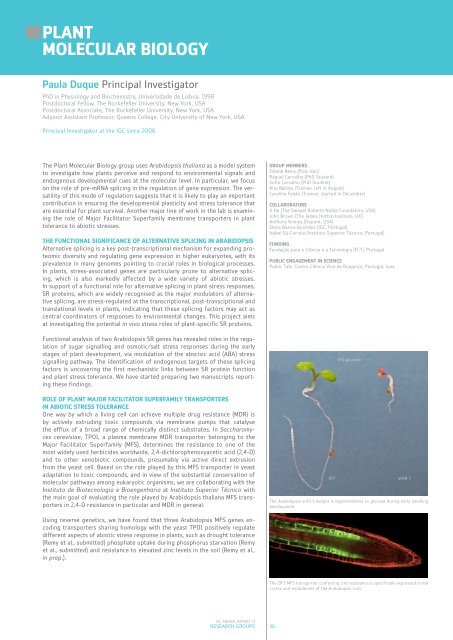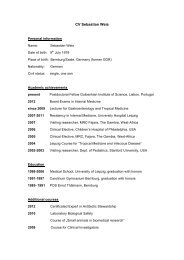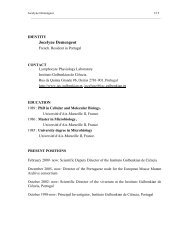organisation - the Instituto Gulbenkian de Ciência
organisation - the Instituto Gulbenkian de Ciência
organisation - the Instituto Gulbenkian de Ciência
- No tags were found...
You also want an ePaper? Increase the reach of your titles
YUMPU automatically turns print PDFs into web optimized ePapers that Google loves.
PLANT<br />
MOLECULAR BIOLOGY<br />
Paula Duque Principal Investigator<br />
PhD in Physiology and Biochemistry, Universida<strong>de</strong> <strong>de</strong> Lisboa, 1998<br />
Postdoctoral Fellow, The Rockefeller University, New York, USA<br />
Postdoctoral Associate, The Rockefeller University, New York, USA<br />
Adjunct Assistant Professor, Queens College, City University of New York, USA<br />
Principal Investigator at <strong>the</strong> IGC since 2006<br />
The Plant Molecular Biology group uses Arabidopsis thaliana as a mo<strong>de</strong>l system<br />
to investigate how plants perceive and respond to environmental signals and<br />
endogenous <strong>de</strong>velopmental cues at <strong>the</strong> molecular level. In particular, we focus<br />
on <strong>the</strong> role of pre-mRNA splicing in <strong>the</strong> regulation of gene expression. The versatility<br />
of this mo<strong>de</strong> of regulation suggests that it is likely to play an important<br />
contribution in ensuring <strong>the</strong> <strong>de</strong>velopmental plasticity and stress tolerance that<br />
are essential for plant survival. Ano<strong>the</strong>r major line of work in <strong>the</strong> lab is examining<br />
<strong>the</strong> role of Major Facilitator Superfamily membrane transporters in plant<br />
tolerance to abiotic stresses.<br />
THE FUNCTIONAL SIGNIFICANCE OF ALTERNATIVE SPLICING IN ARABIDOPSIS<br />
Alternative splicing is a key post-transcriptional mechanism for expanding proteomic<br />
diversity and regulating gene expression in higher eukaryotes, with its<br />
prevalence in many genomes pointing to crucial roles in biological processes.<br />
In plants, stress-associated genes are particularly prone to alternative splicing,<br />
which is also markedly affected by a wi<strong>de</strong> variety of abiotic stresses.<br />
In support of a functional role for alternative splicing in plant stress responses,<br />
SR proteins, which are wi<strong>de</strong>ly recognised as <strong>the</strong> major modulators of alternative<br />
splicing, are stress-regulated at <strong>the</strong> transcriptional, post-transciptional and<br />
translational levels in plants, indicating that <strong>the</strong>se splicing factors may act as<br />
central coordinators of responses to environmental changes. This project aims<br />
at investigating <strong>the</strong> potential in vivo stress roles of plant-specific SR proteins.<br />
GROUP MEMBERS<br />
Estelle Remy (Post-doc)<br />
Raquel Carvalho (PhD Stu<strong>de</strong>nt)<br />
Sofia Carvalho (PhD Stu<strong>de</strong>nt)<br />
Rita Batista (Trainee, left in August)<br />
Carolina Feijão (Trainee, started in December)<br />
COLLABORATORS<br />
Ji He (The Samuel Roberts Noble Foundation, USA)<br />
John Brown (The James Hutton Institute, UK)<br />
Anthony Kinney (Dupont, USA)<br />
Elena Baena-González (IGC, Portugal)<br />
Isabel Sá-Correia (<strong>Instituto</strong> Superior Técnico, Portugal)<br />
FUNDING<br />
Fundação para a Ciência e a Tecnologia (FCT), Portugal<br />
PUBLIC ENGAGEMENT IN SCIENCE<br />
Public Talk, Centro Ciência Viva <strong>de</strong> Bragança, Portugal, June<br />
Functional analysis of two Arabidopsis SR genes has revealed roles in <strong>the</strong> regulation<br />
of sugar signalling and osmotic/salt stress responses during <strong>the</strong> early<br />
stages of plant <strong>de</strong>velopment, via modulation of <strong>the</strong> abscisic acid (ABA) stress<br />
signalling pathway. The i<strong>de</strong>ntification of endogenous targets of <strong>the</strong>se splicing<br />
factors is uncovering <strong>the</strong> first mechanistic links between SR protein function<br />
and plant stress tolerance. We have started preparing two manuscripts reporting<br />
<strong>the</strong>se findings.<br />
ROLE OF PLANT MAJOR FACILITATOR SUPERFAMILY TRANSPORTERS<br />
IN ABIOTIC STRESS TOLERANCE<br />
One way by which a living cell can achieve multiple drug resistance (MDR) is<br />
by actively extruding toxic compounds via membrane pumps that catalyse<br />
<strong>the</strong> efflux of a broad range of chemically distinct substrates. In Saccharomyces<br />
cerevisiae, TPO1, a plasma membrane MDR transporter belonging to <strong>the</strong><br />
Major Facilitator Superfamily (MFS), <strong>de</strong>termines <strong>the</strong> resistance to one of <strong>the</strong><br />
most wi<strong>de</strong>ly used herbici<strong>de</strong>s worldwi<strong>de</strong>, 2,4-dichlorophenoxyacetic acid (2,4-D)<br />
and to o<strong>the</strong>r xenobiotic compounds, presumably via active direct extrusion<br />
from <strong>the</strong> yeast cell. Based on <strong>the</strong> role played by this MFS transporter in yeast<br />
adaptation to toxic compounds, and in view of <strong>the</strong> substantial conservation of<br />
molecular pathways among eukaryotic organisms, we are collaborating with <strong>the</strong><br />
<strong>Instituto</strong> <strong>de</strong> Biotecnologia e Bioengenharia at <strong>Instituto</strong> Superior Técnico with<br />
<strong>the</strong> main goal of evaluating <strong>the</strong> role played by Arabidopsis thaliana MFS transporters<br />
in 2,4-D resistance in particular and MDR in general.<br />
The Arabidopsis sr45-1 mutant is hypersensitive to glucose during early seedling<br />
<strong>de</strong>velopment.<br />
Using reverse genetics, we have found that three Arabidopsis MFS genes encoding<br />
transporters sharing homology with <strong>the</strong> yeast TPO1 positively regulate<br />
different aspects of abiotic stress response in plants, such as drought tolerance<br />
(Remy et al., submitted) phosphate uptake during phosphorus starvation (Remy<br />
et al., submitted) and resistance to elevated zinc levels in <strong>the</strong> soil (Remy et al.,<br />
in prep.).<br />
The ZIF2 MFS transporter conferring zinc resistance is specifically expressed in <strong>the</strong><br />
cortex and endo<strong>de</strong>rmis of <strong>the</strong> Arabidopsis root.<br />
IGC ANNUAL REPORT ‘11<br />
RESEARCH GROUPS<br />
36






